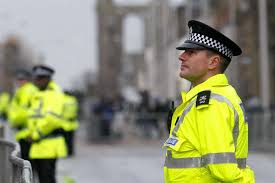By Tony O’Reilly-
Hundreds of police officers have been off work with long Covid since the pandemic hit, new data has revealed.
A total of 345 employees recorded an absence under the ‘Covid-19 post-covid syndrome’ category – which is used for anyone with a Covid-related absence of more than 12 weeks – on the force’s personnel database.
The majority – 212 – of long Covid absences have been recorded by police officers since the category was introduced in July 2020.
According to the figures, obtained by Scottish justice and social affairs magazine 1919 through a Freedom of Information request, in the current financial year up to December there were 131 long Covid absences recorded by officers and staff.
The NHS describes the most common long Covid symptoms as extreme tiredness, shortness of breath, loss of smell and muscle aches, though the condition and its effects are still being studied.
The Scottish government has invested an initial £3 million to enable patients access to services including physiotherapy, occupational therapy and mental health support.
But it has been claimed this has not gone far enough to help those affected by the “hugely debilitating” condition.
David Kennedy, general secretary of the Scottish Police Federation, said: “The issues surrounding Covid-19 will be far-reaching for generations and we can only hope that the public inquiries both in Scotland and the UK wide will shine a light on these issues.
“We need to make sure that our governments and police services continue to help their police officers and staff as they come to terms with the impact that long Covid is having in their lives.
“The physical, mental and financial help that will be required in years to come needs to be a priority for them.
“We need to learn from where it went wrong and make sure that any mistakes are not repeated.”
Police Scotland Assistant Chief Constable Alan Speirs said: “Officers and staff showed outstanding professionalism and commitment to help keep people safe during the pandemic.
“Their health and welfare is one of Police Scotland’s main priorities and we have a range of mechanisms in place to support them, including the Employee Assistance Programme and the Your Wellbeing Matters programme.
“We also work with our occupational health provider to support police officers and staff in their journey back to health after a period of absence.”
The force also pointed out that it is “possible” that an individual was categorised absent with ‘post-Covid syndrome’ for a period of time before another diagnosis was reached.
1919 previously reported that police officers and bus drivers were among those at the highest risk of Covid infection during the pandemic.
According to academic research into occupational differences in the UK workforce, there was a ‘hazard ratio’ of 1.45 for police and protective services personnel when compared with non-essential workers.
Scottish Liberal Democrat leader Alex Cole-Hamilton said his party wanted to see dedicated long Covid clinics across the country and Scotland-wide access to physiotherapy and rehabilitation.
Referring to the number of police officers impacted by the condition, he said: “Figures like these emphasise why we need to treat long Covid with the seriousness it merits.
“Long Covid is a hugely debilitating condition, but the Scottish government’s response has been lacklustre.
“This paltry response will only lead to higher staff and officer absences and to more patients being put on hold without solutions.”
Health Secretary Humza Yousaf defended his government’s response and investment in services to help those suffering with the condition.
He told 1919: “All NHS Scotland boards are providing assessment and support for people with long Covid, delivered across the full range of NHS services – backed by our substantial 2022/23 £18 billion investment in health.
“Over 2022/23 we’ve made available an initial £3 million from our £10 million long Covid Support Fund to provide NHS boards and partners with additional resource to deliver the best local models of care for assessment, and support for the treatment or management of symptoms.
“Initiatives being supported by the funding include key elements of care that are also offered by long Covid assessment clinics elsewhere in the UK, including single point of access for assessment and coordinated support from physiotherapy, occupational therapy and other services tailored to people’s needs.
“We’re working closely with boards, third-sector organisations and people living with long Covid to identify opportunities to maximise the impact of funding available.”




